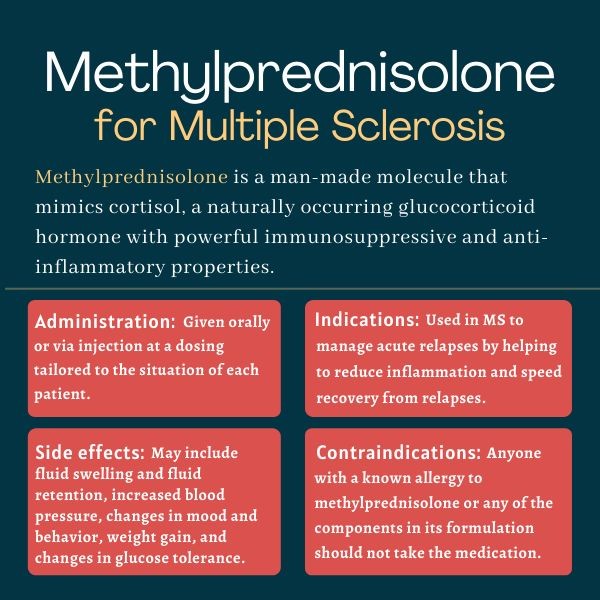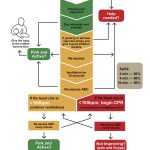
Contents
Side Effects of Medrol (methylprednisolone)
Chronic allergic and inflammatory conditions of the uvea, iris, conjunctiva, and optic nerves of the eyes are also treated with Medrol.
Medrol is used for treating shock and multiple sclerosis, although its use in these conditions is controversial. Corticosteroids are naturally-occurring chemicals produced by the adrenal glands located adjacent to the kidneys. Corticosteroids affect metabolism and modify the immune system.
Common side effects of Medrol include:
- fluid retention
- weight gain
- high blood pressure (hypertension)
- potassium loss
- headache
- muscle weakness
- puffiness of the face
- hair growth on the face
- thinning and easy bruising of the skin
- glaucoma
- cataracts
- peptic ulceration
- worsening of diabetes
- irregular menses
- growth retardation in children
Serious side effects of Medrol include:
- shortness of breath (even with mild exertion)
- wounds that will not heal
- tunnel vision
- eye pain
- psychic disturbances (depression, euphoria, insomnia, mood swings, personality changes, and psychotic behavior)
- new or unusual pain in an arm or leg or in your back
- bloody or tarry stools
- coughing up blood or vomit that looks like coffee grounds
- seizures (convulsions)
- low potassium (leg cramps, constipation, irregular heartbeats, fluttering in your chest, increased thirst or urination, numbness or tingling)
Medrol may interact with the following drugs:
- aspirin (taken on a daily basis or at high doses)
- diuretics (water pills)
- blood thinners
- cyclosporine
- insulin or oral diabetes medications
- ketoconazole
- rifampin
- seizure medications
- "live" vaccines
Medrol has not been adequately evaluated in pregnant women or nursing mothers. Consult your doctor before breastfeeding.
What are the important side effects of Medrol (methylprednisolone)?
Adverse effects of methylprednisolone depend on dose, duration, and frequency of administration. Short courses of methylprednisolone are usually well-tolerated with few, mild side effects. Long-term, high doses of methylprednisolone may produce serious side effects.
Whenever possible, the lowest effective doses of methylprednisolone should be used for the shortest length of time to minimize side effects. Alternate day dosing can also help reduce side effects.
Side effects of methylprednisolone and other corticosteroids range from mild annoyances to serious irreversible bodily damage.
Commonly reported side effects include:
- fluid retention
- weight gain
- high blood pressure
- potassium loss
- headache
- muscle weakness
- puffiness of the face
- hair growth on the face
- thinning and easy bruising of the skin
- glaucoma
- cataracts
- peptic ulceration
- worsening of diabetes
- irregular menses
- growth retardation in children
- convulsions
- psychic disturbances
Important psychic disturbances may include:
- depression
- euphoria
- insomnia
- mood swings
- personality changes
- psychotic behavior
Medrol (methylprednisolone) side effects list for healthcare professionals
Fluid and Electrolyte Disturbances
Sodium retention
Congestive heart failure in susceptible patients
Hypertension
Fluid retention
Potassium loss
Hypokalemic alkalosis
Musculoskeletal
Muscle weakness
Loss of muscle mass
Steroid myopathy
Osteoporosis
Tendon rupture, particularly of the Achilles tendon
Vertebral compression fractures
Aseptic necrosis of femoral and humeral heads
Pathologic fracture of long bones
Gastrointestinal
Peptic ulcer with possible perforation and hemorrhage
Pancreatitis
Abdominal distention
Ulcerative esophagitis
Dermatologic
Impaired wound healingPetechiae and ecchymoses
May suppress reactions to skin tests
Thin fragile skin
Facial erythema
Increased sweating
Neurological
Increased intracranial pressure with papilledema (pseudo-tumor cerebri) usually after treatment
Convulsions
Vertigo
Headache
Endocrine
Development of Cushingoid state
Suppression of growth in children
Secondary adrenocortical and pituitary unresponsiveness, particularly in times of stress, as in trauma, surgery or illness
Menstrual irregularities
Decreased carbohydrate tolerance
Manifestations of latent diabetes mellitus
Increased requirements of insulin or oral hypoglycemic agents in diabetics
Ophthalmic
Posterior subcapsular cataracts
Increased intraocular pressure
Glaucoma
Exophthalmos
Metabolic
Negative nitrogen balance due to protein catabolism
The following additional reactions have been reported following oral as well as parenteral therapy: Urticaria and other allergic, anaphylactic or hypersensitivity reactions.
What drugs interact with Medrol (methylprednisolone)?
The pharmacokinetic interactions listed below are potentially clinically important.
- Mutual inhibition of metabolism occurs with concurrent use of cyclosporin and methylprednisolone; therefore, it is possible that adverse events associated with the individual use of either drug may be more apt to occur.
- Convulsions have been reported with concurrent use of methylprednisolone and cyclosporin.
- Drugs that induce hepatic enzymes such as phenobarbital, phenytoin and rifampin may increase the clearance of methylprednisolone and may require increases in methylprednisolone dose to achieve the desired response.
- Drugs such as troleandomycin and ketoconazole may inhibit the metabolism of methylprednisolone and thus decrease its clearance. Therefore, the dose of methylprednisolone should be titrated to avoid steroid toxicity.
- Methylprednisolone may increase the clearance of chronic high dose aspirin. This could lead to decreased salicylate serum levels or increase the risk of salicylate toxicity when methylprednisolone is withdrawn.
- Aspirin should be used cautiously in conjunction with corticosteroids in patients suffering from hypoprothrombinemia.
- The effect of methylprednisolone on oral anticoagulants is variable. There are reports of enhanced as well as diminished effects of anticoagulant when given concurrently with corticosteroids.
- Therefore, coagulation indices should be monitored to maintain the desired anticoagulant effect.
Summary
Medrol (methylprednisolone) is a synthetic corticosteroid used to suppress inflammation in various conditions and diseases. Common side effects of Medrol include fluid retention, weight gain, high blood pressure, potassium loss, headache, muscle weakness, puffiness of the face, hair growth on the face, thinning and easy bruising of the skin, glaucoma, cataracts, peptic ulceration, worsening of diabetes, irregular menses, and growth retardation in children. Medrol has not been adequately evaluated in pregnant women or nursing mothers.


